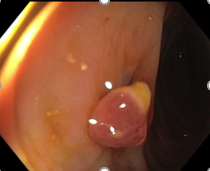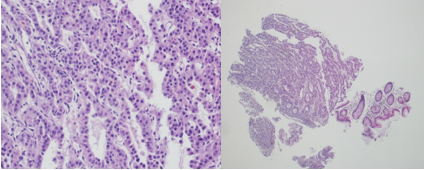Sunday Poster Session
Category: Liver
P1710 - Gastrointestinal Bleeding due to Colonic Metastasis: An Unusual Presentation of Recurrent Hepatocellular Carcinoma Post-Liver Transplant
Sunday, October 26, 2025
3:30 PM - 7:00 PM PDT
Location: Exhibit Hall

Doaa Alkhader, MD (she/her/hers)
Cleveland Clinic Abu Dhabi
Abu Dhabi, Abu Dhabi, United Arab Emirates
Presenting Author(s)
Doa'a Alkhader, MD, Fatma Mahmoud, MBBCh, Shiva Kumar, MD
Cleveland Clinic Abu Dhabi, Abu Dhabi, Abu Dhabi, United Arab Emirates
Introduction: Hepatocellular carcinoma (HCC) is a primary hepatic malignancy with a well-documented propensity for extrahepatic dissemination, frequently involving the lungs, bones, and regional lymph nodes. Involvement of the gastrointestinal tract is rare and typically occurs via direct extension. Hematogenous metastasis to the colon is exceedingly uncommon and has not been previously described post-liver transplant. We present a case of lower gastrointestinal bleeding due to isolated colonic metastasis from recurrent HCC in a post-transplant patient—an exceptionally rare clinical scenario with important diagnostic and prognostic implications
Case Description/
Methods: A 62-year-old male status post living donor liver transplantation due cirrhosis secondary to metabolic dysfunction-associated steatotic liver disease , complicated by HCC . Seven years after transplantation, he was found to have recurrent multifocal HCC.
He presented with new-onset painless rectal bleeding. Colonoscopy revealed a solitary 7 mm polypoid lesion in the descending colon (Figure 1). Histopathology demonstrated mixed architectural pattern with pseudoglandular and trabecular arrangements, focal intraluminal bile, and cellular morphology suggestive of hepatoid differentiation. Immunohistochemical staining was consistent with metastatic HCC (Figure 2). Cross-sectional abdominal imaging showed multifocal hepatic recurrence without evidence of contiguous invasion of the colon (Figure 3), suggesting hematogenous dissemination.
The patient's clinical course was characterized by continued disease progression despite systemic therapy, which was poorly tolerated. He is currently receiving palliative care focused on symptom management and quality of life.
Discussion: Colonic metastasis from hepatocellular carcinoma is exceptionally rare, typically resulting from direct local invasion of the bowel wall by an adjacent hepatic mass. Hematogenous spread to the colon represents an atypical and scarcely reported route of dissemination. To our knowledge, this is the first reported case of colonic metastasis from post-transplant recurrent HCC. Early endoscopic evaluation and tissue diagnosis are essential, as such presentations are typically associated with poor prognosis. Given the poor prognosis associated with colonic metastases of HCC, awareness of this rare metastatic pattern may enable timely diagnosis and inform appropriate palliative strategies in this clinical context.

Figure: (Figure 1)
Polypoid lesion in the descending colon

Figure: (Figure 2)
Histopathological examination revealed mixed architectural patterns with pseudoglands, trabeculae with focal luminal bile and hepatoid features consistent with metastatic HCC, confirmed on immunohistochemistry .
Disclosures:
Doa'a Alkhader indicated no relevant financial relationships.
Fatma Mahmoud indicated no relevant financial relationships.
Shiva Kumar indicated no relevant financial relationships.
Doa'a Alkhader, MD, Fatma Mahmoud, MBBCh, Shiva Kumar, MD. P1710 - Gastrointestinal Bleeding due to Colonic Metastasis: An Unusual Presentation of Recurrent Hepatocellular Carcinoma Post-Liver Transplant, ACG 2025 Annual Scientific Meeting Abstracts. Phoenix, AZ: American College of Gastroenterology.
Cleveland Clinic Abu Dhabi, Abu Dhabi, Abu Dhabi, United Arab Emirates
Introduction: Hepatocellular carcinoma (HCC) is a primary hepatic malignancy with a well-documented propensity for extrahepatic dissemination, frequently involving the lungs, bones, and regional lymph nodes. Involvement of the gastrointestinal tract is rare and typically occurs via direct extension. Hematogenous metastasis to the colon is exceedingly uncommon and has not been previously described post-liver transplant. We present a case of lower gastrointestinal bleeding due to isolated colonic metastasis from recurrent HCC in a post-transplant patient—an exceptionally rare clinical scenario with important diagnostic and prognostic implications
Case Description/
Methods: A 62-year-old male status post living donor liver transplantation due cirrhosis secondary to metabolic dysfunction-associated steatotic liver disease , complicated by HCC . Seven years after transplantation, he was found to have recurrent multifocal HCC.
He presented with new-onset painless rectal bleeding. Colonoscopy revealed a solitary 7 mm polypoid lesion in the descending colon (Figure 1). Histopathology demonstrated mixed architectural pattern with pseudoglandular and trabecular arrangements, focal intraluminal bile, and cellular morphology suggestive of hepatoid differentiation. Immunohistochemical staining was consistent with metastatic HCC (Figure 2). Cross-sectional abdominal imaging showed multifocal hepatic recurrence without evidence of contiguous invasion of the colon (Figure 3), suggesting hematogenous dissemination.
The patient's clinical course was characterized by continued disease progression despite systemic therapy, which was poorly tolerated. He is currently receiving palliative care focused on symptom management and quality of life.
Discussion: Colonic metastasis from hepatocellular carcinoma is exceptionally rare, typically resulting from direct local invasion of the bowel wall by an adjacent hepatic mass. Hematogenous spread to the colon represents an atypical and scarcely reported route of dissemination. To our knowledge, this is the first reported case of colonic metastasis from post-transplant recurrent HCC. Early endoscopic evaluation and tissue diagnosis are essential, as such presentations are typically associated with poor prognosis. Given the poor prognosis associated with colonic metastases of HCC, awareness of this rare metastatic pattern may enable timely diagnosis and inform appropriate palliative strategies in this clinical context.

Figure: (Figure 1)
Polypoid lesion in the descending colon

Figure: (Figure 2)
Histopathological examination revealed mixed architectural patterns with pseudoglands, trabeculae with focal luminal bile and hepatoid features consistent with metastatic HCC, confirmed on immunohistochemistry .
Disclosures:
Doa'a Alkhader indicated no relevant financial relationships.
Fatma Mahmoud indicated no relevant financial relationships.
Shiva Kumar indicated no relevant financial relationships.
Doa'a Alkhader, MD, Fatma Mahmoud, MBBCh, Shiva Kumar, MD. P1710 - Gastrointestinal Bleeding due to Colonic Metastasis: An Unusual Presentation of Recurrent Hepatocellular Carcinoma Post-Liver Transplant, ACG 2025 Annual Scientific Meeting Abstracts. Phoenix, AZ: American College of Gastroenterology.
